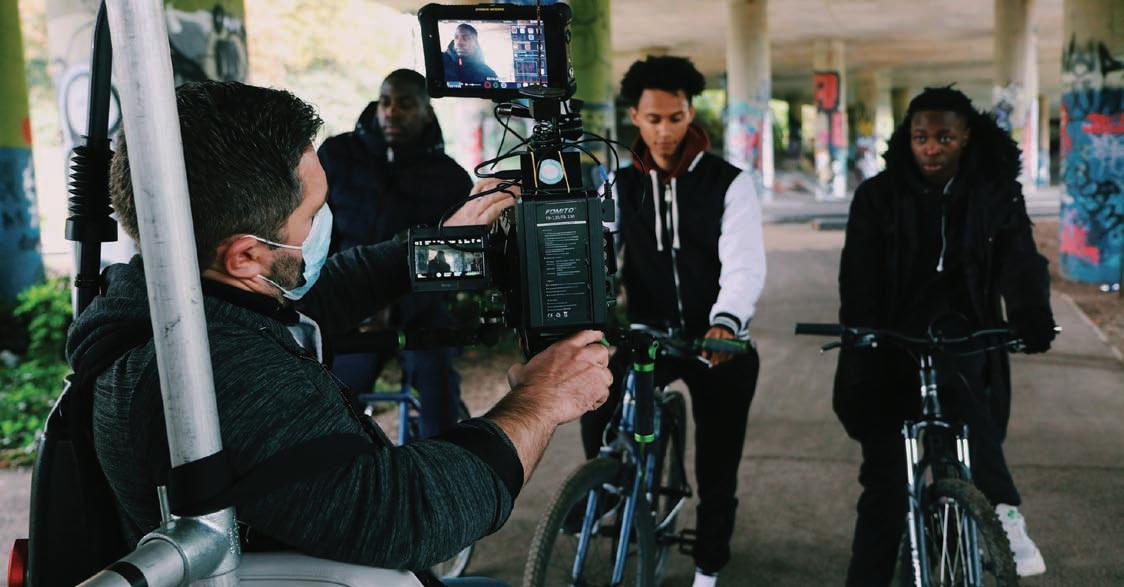
14 minute read
ACTION STATION
4 all of Bristol
Channel 4 got more change than they bargained for when they moved to Bristol in the year a pandemic struck. Nevertheless it’s brought out the best in the city, says the channel’s factual commissioner and head of the Bristol hub
Advertisement
Filming for Blak Wave’s Pickney underway in Bristol
Around a year ago, Channel 4 had just moved a huge swathe of its output –specialist factual, factual entertainment, features and formats, documentary, drama and daytime –to Bristol to help ensure a less London-centric future of tellymaking and build on this city’s thriving TV production sector.
The year of the pivot for many people, 2020 was no different for the broadcaster, which faced a difficult financial period due to the pandemic but managed to end on a high with a healthy financial surplus. The pathway to its digital future, recently set out via a new five-year strategy, includes new targets to double viewing on digital platform All4 by 2025, and a global format fund to invest in UKproduced formats with worldwide potential. Future4 aims to increase content streaming with new revenues underpinning its reach and selfsufficiency. The idea is to ensure C4 can continue delivering distinctive content at scale, meet its public service remit in a more competitive digital viewing environment and create change through entertainment that challenges, and represents unheard voices. Founder of Marble Films, and now head of Bristol’s C4 hub, Sacha Mirzoeff told us more.
TBM: How’s the first year been? How did the pandemic reshape it?
Sacha: I was working as head of an independent TV company before this year, having lived in Bristol for over 20 years, then Channel 4 came to Bristol and got in contact. I thought them being here was such an exciting proposition –I’ve always believed in what they do and stand for, the way they take risks as a channel and give a voice to underrepresented people. I thought I should give it a go, and spent so long thinking through every eventuality about what the year might bring… Life is full of surprises and it’s been some year –I’ve spent three quarters of it in my own house! But it’s been brilliant; we’ve been able to continue with production in the vast majority of cases and had some outstanding films go out. It’s somehow brought out the best of British and the best of Bristol.
What’s coming up?
The Doghouse is a lovely, warm series made in Bristol by Five Mile Films about rehoming stray dogs but it’s really about the people who come and collect those dogs and what’s going on for them. We do feel people need the equivalent of a hot chocolate to take them away from the misery of the world at the moment. We have First Dates now being made out of Bristol –Twenty Twenty, the company that makes it, has moved fully down here, training up a load of editors to work on the show. That’s as important to us as the actual programmes, that we’re changing workforce on the ground here, and who’s working in the TV industry; bringing a wider range of voices from different communities.
Have there been any pandemic positives?
With Zoom, you can be a company in North Wales and have exactly the same kind of access to Channel 4 as a company in Soho; there’s a uniformity of access. The idea of the hubs was to cut down on all the travelling to London that independents were doing; for what was often a half-hour meeting with a pressurised commissioner. But our workforce is made up of freelancers –the creative blood of this industry, the people who make productions sing –and the past year has been extraordinarily challenging for them.
What’s been your most fulfilling or feel-good factual commission?
The Year That Changed Love made by Bristol company Keo West. Positive, uplifting stories about love in lockdown; so sweet. Coming up in spring we’ve got a new craft show called Good With Wood made from Bristol by Plimsoll Productions. It’s really fun –the contributors produce extraordinary bits of work in a matter of days.
Extraordinarily! We’ve been welcomed with open arms on every level; local government, community, individuals. People have been patient with us as well, it’s been hard to engage locally this year. We’re keen to find big, universal stories that still have a very local setting. Derry Girls is a good example; it works across the world but is so clearly set in one place. Part of the Bristol hub is about finding those voices; stories that are supremely local. I love working in communities that probably don’t get enough representation but have brilliant characters and brilliant stories to be told. Bristol has been traditionally known for a small number of areas in the centre and I’m equally interested in hearing about areas that don’t get the headlines. This has been a tumultuous time for the city, especially with the statue coming down; and I feel like we’re culturally leading the world in some respects at the moment which is very exciting.
The Doghouse is a lovely, warm series about rehoming stray dogs but it’s really about the people who come and collect those dogs
How was it to be a TV maker in the thick of a global news moment?
It was a massive advantage. It was like it was meant to be; we were so aligned with what’s happened in so many ways. We were able to react very quickly so within a week of the statue coming down we were commissioning programmes, but we wanted a filmmaker with a real insight into the issue. We were fortunate to work with Michael Jenkins (Blak Wave Productions), who had been in the process of making a film about Colston for many years already. From within the community here, he knew the subject matter really well. Him doing that story gave it a different level of authenticity. He was out on the day filming anyway and we were able to tell his story, and the city’s story in a sense, with a series called Take Your Knee Off My Neck.
What actually happens in the new Finzels Reach hub?
No filming takes place in the Fermentation Buildings; we commission local independent companies to do that. It’s where commissioners and office staff work from. All being well, we’re due to open again early this year. It’s central and easily accessible and part of its purpose was to have a semi-open house. We wanted to hold events and have people in, engage with community and be more public about being here. We offer support and training for people coming into the industry through our new arm 4Skills. Although Bristol is a world-leader in film and TV, it’s a narrow section of society that’s traditionally worked in it and we’d love to facilitate different kinds of people coming in. There’s lots of brilliant work going on in that way already and we’re not looking to reinvent that or take over, but to work alongside it. It’s an important change of strategy that has the viewer in mind. You should be able to binge more on boxsets, find what you like a lot easier; our digital platform All4 is going to have greater importance for us and should become more user-friendly. Figures there are booming but we want to future-proof ourselves. Our digital arm, now up and running, will be doing original content this year which is another different revenue stream for us.
Are you able to take more risks when commissioning for digital?
I think we should take risks across the platform and don’t think we’ve stopped taking risks on the main channel despite it being a challenging time, but yes. We’re working with a new talent in documentary terms, Yinka Bokinni –who did a brilliant film about Damilola Taylor and her reflection on that as a young child. She’d done a podcast, worked in music and radio then found TV and that development of talent through digital is really important for us. Often it’s hard to break talent straight away to our 9pm prime slot; digital allows us to engage with people closely in a meaningful way before they’re exposed heavily in the main schedule.
Tell us about the Bristol recipients of the emerging indie fund
They’re four companies representing the breadth of talent in Bristol –drama company Indefinite Films; documentary companies Drummer TV (with a brilliant record of developing skills and nurturing talent) and Blak Wave (new, exciting and one year old, now, like us); history experts Proper Job, recently set up and run by long-standing Bristol producer-director Harvey Lilley and journalist Patrick Bishop. They’re happy not to be jumping on £100 trains to London anymore! Secret History is going through a big relaunch this year. It’s all about fresh journalist revelations on historical events that make us see them in a new light; see what we’ve learnt, haven’t learnt and can do better.
What impact has C4 Bristol had so far? What’s planned for its future?
I think we’ve landed really successfully given the extraordinary circumstances. Our team is strong, there’s a brilliant raft of films coming out of Bristol, some with first-time directors; a huge range of work. This year we hope to be far more engaged across the city and surrounding areas in terms of how we push out into the communities more, with a new workforce on top-level productions. ■
The Fermentation Buildings house commissioners and office staff
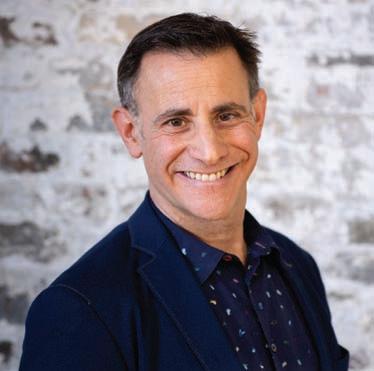
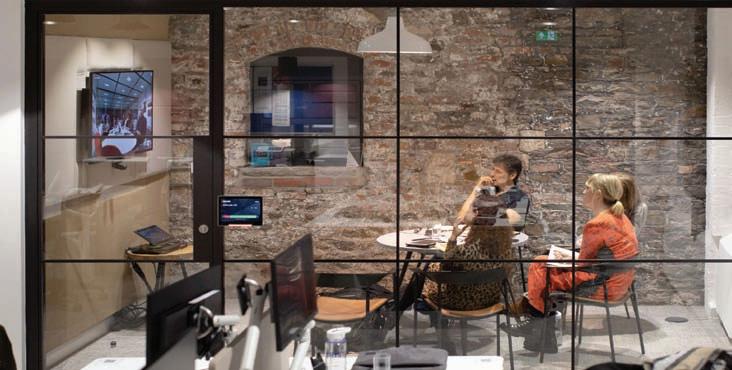
At a roadshow at Salisbury Cathedral in 2019
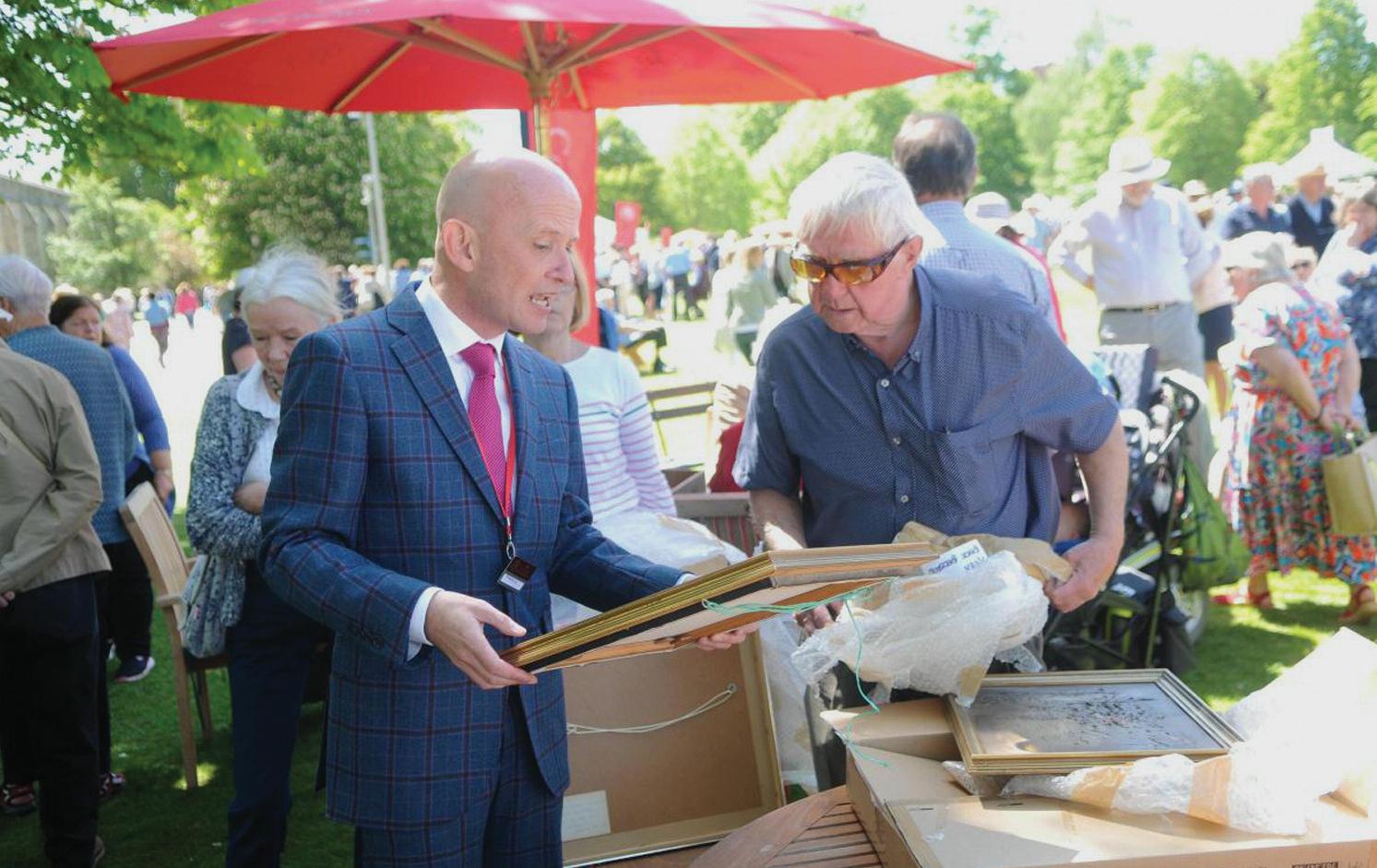
Design for life
Ahead of a new monthly column for The Bristol Magazine, we get to know expert curator Chris Yeo –specialist in 20th-century design and craft –a little better
Chris Yeo has just joined the team at one of the longest established fine art auction houses in the South West, cataloguing Clevedon Salerooms’ antique, interiors, collectables and jewellery auctions and quarterly specialists sales, and dealing with valuation enquiries. Known to many from his appearances on BBC’s Antiques Roadshow, Chris also works as curator of Bristol’s Ken Stradling Collection.
TBM: You’re wearing at least three hats now – how will you divide your time between the Salerooms, Roadshow and Ken Stradling?
Chris: Antiques Roadshow usually takes up only a few days of the year; for that reason all the specialists on the programme have ‘day jobs’, working with art and antiques. I’ve handed over a lot of my day-to-day work as curator at the Ken Stradling Collection and have instead been concentrating on helping develop a programme of online talks and other activities to enable us to carry on during lockdown and beyond. I’ll also be curating exhibitions in our new window gallery, which people can view from the street outside. It’s a manageable load which I’ll be able to fit in alongside my work at Clevedon but I don’t envisage much ‘down time’. It’s a good job I enjoy being busy!
What have been your most storied items in recent times?
There have been so many highlights on Antiques Roadshow but I think the most memorable item was the script for the first ever episode of Dr Who which I valued. The owner had been given it by his grandfather and although he knew it had some value, he had no idea exactly how valuable. He almost fainted when I told him it would likely sell for between £5,000 and £7,000. He did go on to sell it – for £7,500 –and the story made the national news.
For those who aren’t familiar, what is the Ken Stradling Collection?
It’s a remarkable collection –approximately 2000 items –of 20th and 21st-century decorative art which has been put together over the last 70 years. Ken Stradling, my boss, was for many years the managing director of the Bristol Guild of Applied Art –which he joined in 1948 –and was one of the first people to popularise modern design in Britain. We’re different from other museums, in fact we don’t even call ourselves a museum. We encourage people to look at and handle things, pick up a vase or even sit on a chair, so there are no ropes and no ‘please do not touch’ signs. We’re keen that learning to look at something, to appreciate an object, is as important as making that object. The collection is based in a four-storey building in central Bristol which is open to the public by appointment.
Tell us about about some of the pieces in the collection
The jewel in our crown is a unique group of furniture designed in 1935 by Marcel Breuer for the Bristol home of furniture manufacturer Crofton Gane. Gane played a pivotal role in introducing the Modern Movement to 1930s Britain. He and Crofton became friends shortly before Breuer arrived in England after the closure of the Bauhaus. The 10 pieces of furniture we have are pivotal in the development of Marcel Breuer’s style and, for that reason, are of international significance. Ken was also one of the first people to sell Scandinavian
design in the UK and the collection has some fantastic mid-century pieces from Denmark, Sweden and Finland.
How did you get the job?
Before I joined the Collection I’d worked for an auctioneers, which is where I got to know Ken as he was one of our regular buyers. Even then people knew about Ken’s collection but, as it wasn’t then open to the public, very few people had actually seen it and it had acquired an almost mythical status. Then, a few years ago, Ken started to open the collection to the public and I was one of the first visitors. On my first visit, I asked if the collection had been catalogued and when I found out it hadn’t I offered my services – sometimes it helps to be a bit cheeky. That eventually led to me being offered the job as curator.
What got you interested in antiques?
I’ve always been fascinated by the objects around me. Even before I could speak I remember being spellbound by furniture and household bits and pieces. My grandparents would take me to antiques fairs and, unlike most small children, I loved it. That led to a fascination with country houses and I would always be badgering my poor parents to take me to the nearest National Trust house. At 10 I started writing to the curator of Longleat House, who was very helpful and really supported my interest. Aged 14, I started buying and selling antiques from a weekend market stall in the local village hall. I studied history at university and then, in my 20s, had a spell working outside the field, but the lure of antiques kept calling, so I went back to university and did a master’s degree in fine art valuation after which I worked in an auction house, which led to the Ken Stradling Collection and Lorfords Antiques in Tetbury.
Do you have a favourite local spot?
I grew up in Somerset and have lived in Bristol for 20 years, so that’s a tough question. For Bristol, it would be Somerset Street in Kingsdown – an incredibly atmospheric street of Georgian houses with spectacular views over the city centre. In Somerset it would have to be the lighthouse on the beach at Burnham-on-Sea, where I lived as a child. If ever I need space to think something out, I always head there knowing that my mountains will shrink to molehills the moment I arrive.
What else have you been up to in 2021 so far?
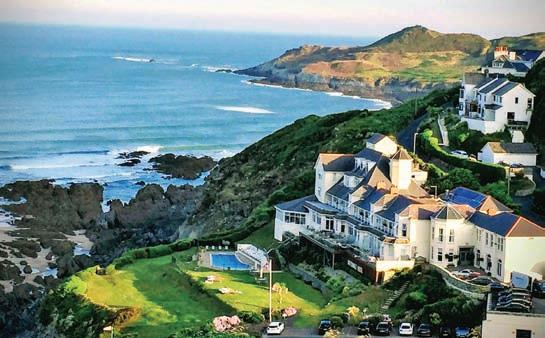
Reading! I’ve collected books all my life and own hundreds but, being very easily distracted, I rarely got round to reading them properly. So I decided to use lockdown as an opportunity to give my books some attention and improve my concentration skills at the same time. ■ • clevedon-salerooms.com; @chrisyeo_antiques (Instagram)
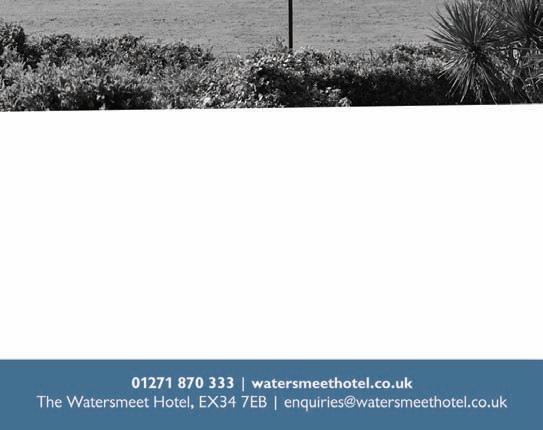
Antiques Roadshow, Compton Verney, 2019
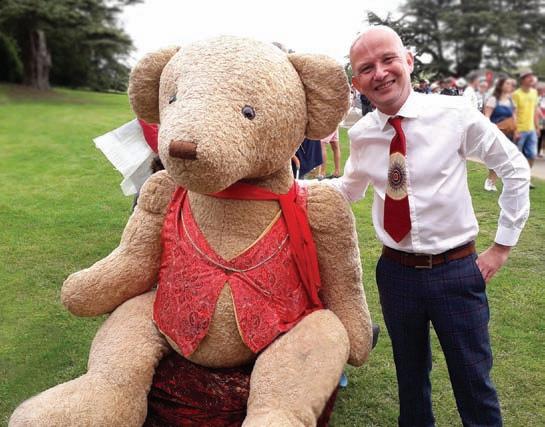
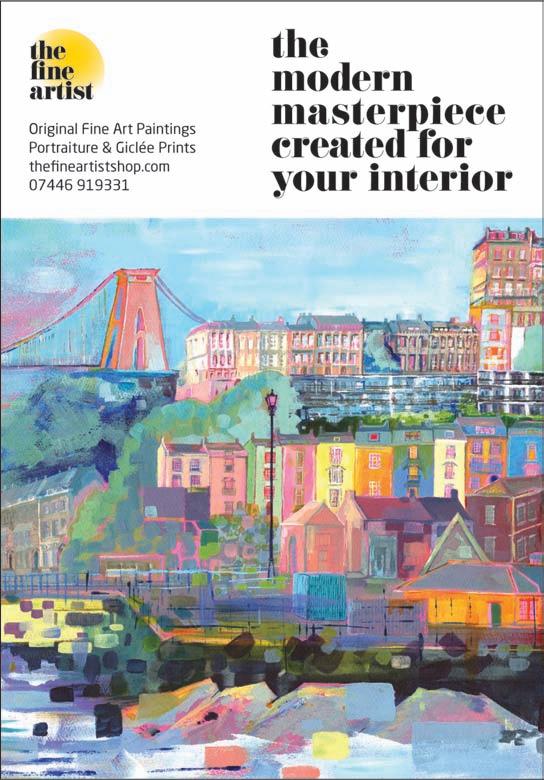
The Watersmeet Hotel in Woolacombe is a four star hotel on the waters edge with an indoor and outdoor pool & spa. Private steps lead directly to the beach. Dramatic views to the sea from our two restaurants which include a bistro and a fine dining à la carte restaurant.
The hotel will reopen its doors on the 17th May, a fabulous time to visit the North Devon coast to take in the healthy sea air on the beach or one of the coastal paths on our doorstep.
•3 Night Break - Sun to Wed.
To include breakfast, staying in a deluxe sea view room. £585 • Our luxury Suites and Balcony rooms start from £260 per night. • Deluxe and Classic rooms from £210 all with sea views.
See our website for other special offers










